Massasoit Commonwealth Honors Students Display Research Projects
On Friday, April 26, students in the Commonwealth Honors program presented a visual display of their semester long research to the college community and the public at the Spring 2024 Honors Conference in the Grove at the Massasoit Brockton Campus Library.
Colleen Cesario
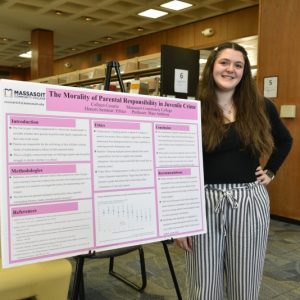
Faculty: Mare Ambrose
Division of Humanities and Communication Arts
The Morality of Parental Responsibility in Juvenile Crime
In recent decades, the rise of gun violence committed by minors has raised concerns regarding whether the minor alone should bear legal responsibility or if their parents should also be held culpable. It is the parent’s responsibility to do everything possible to prevent their children from posing a threat to society. Parents face a unique position, as they bear legal responsibility for their child’s actions, and any negligence on their part signifies a failure in fulfilling their parental duties. If it can be proven that a parent’s action or inaction directly contributes to their child’s crime, they must be held responsible. Examining cases of this kind where parents have been prosecuted for their children’s crimes provides ethical justification for charging parents who fail to fulfill their responsibilities. The inconsistency in parental responsibility laws across the United States is harmful as it creates confusion and inequity, leading to disparities in accountability and justice for families involved in similar situations. Most parental responsibility laws only cover specific offenses and typically impose fines as the sole penalty. This creates a gap in prosecuting crimes such as murder, as fines alone are inadequate in resolving such serious offenses. Investigating this issue is crucial because without establishing parameters of morality, there is a risk of parents being unjustly persecuted. Charging parents for their child’s crime, even when they have made efforts to intervene and address potential warning signs, is dangerous as it allows the law to overreach into the family unit.
Linda Chaney
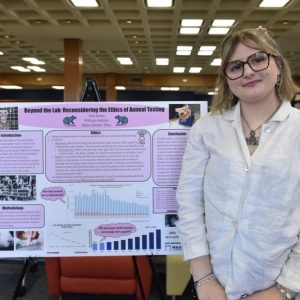
Faculty: Mare Ambrose
Division of Humanities and Communication Arts
The Ethics of Animal Testing
The ethical dilemma in using animals for laboratory testing and experiments has triggered intense debates. Supporters believe the need to use animals in laboratories is essential to research and development, while opponents highlight the cruelty and immorality of using sentient beings for experimentation. Many labs and companies simply put it: ‘”it’s your child or the rat”, with animal testing ensuring the safety of home products and medicines. The 1966 Animal Welfare Act is the minimally accepted standard for the treatment and exhibition of animals, amended eight times to extend protections for animals in exhibition. Many laboratory animals will struggle for protection. In 2002, the term “animal” was even redefined to exclude birds, rats and mice from its protection, which according to People for the Ethical Treatment of Animals (PETA), comprise over 90 percent of the animals tested on each year. Books, articles, scientific journals as well as documentaries were examined for the ethical implications of animal testing in laboratories. Research with human volunteers, computer technologies and in vitro studies based on human cells and tissues are just some of the critical advancements explored as alternatives to testing on animals.
CJ Fernandes-Bembery
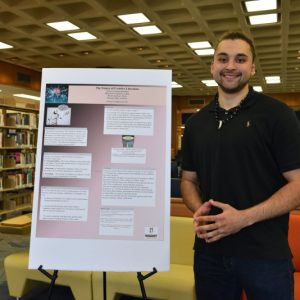
Faculty: Mare Ambrose
Division of Humanities and Communication Arts
The Future of Creative Writing in a World Dominated by Artificial Intelligence
As humans evolve, so does the technology that has been created. Some predict that many jobs and careers will be taken over by Artificial Intelligence (AI). However, when it comes to creative literature, there are certain components that cannot be replaced by this technology. What distinguishes creative expression is a signature voice, the unique style and expression that a writer conveys through his individual experience, beliefs and emotions. While AI has demonstrated impressive capabilities in generating artistic content, there is potential for AI to disrupt creative works. This examination of academic journals and professional articles demonstrates that as of the present day, AI cannot replace writers of creative literature.
Alison Hughes
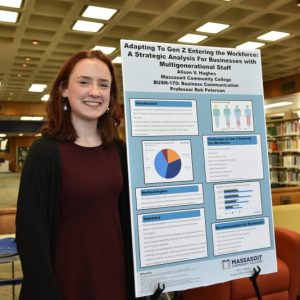
Faculty: Rob Peterson
Division of Business and Technology
Adapting to the Multigenerational Workforce: A Strategic Analysis for Corporate Communication
Employees of today’s corporations span many generations, from Baby Boomers with decades of experience to Gen Z working their first jobs. as the workforce undergoes a significant Generational Transformation with the entry of Generation Z (Gen Z), businesses are challenged with adapting to new intrapersonal dynamics in the work environment. This report will gather data on generational dynamics in business using various research methodologies such as case studies, surveys, peer-reviewed academic articles, and business publications. These findings highlight successful and unsuccessful adaptation practices and will assist in determining the best strategies to recommend. This report will delve into the challenges and opportunities that a mock corporate marketing company faces with the introduction of Gen Z into the workforce. Actionable recommendations will be proposed to effectively resolve challenges and capitalize on the opportunities presented by a multigenerational workforce. Additionally, an analysis will explore the benefits and risks of implementing these specific recommendations.
Stacy Mendonca
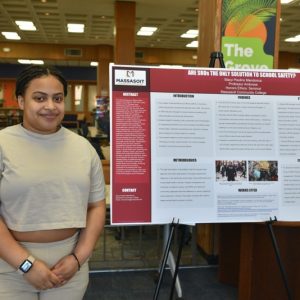
Faculty: Mare Ambrose
Division of Humanities and Communication Arts
Who Are School Resource Officers Benefiting?
The School Resource Office (SRO) program first began in 1953 when police officers in Flint, Michigan were permanently placed in schools to positively interact with the youth while enforcing the law. The program has seen substantial growth since 1953 with the duties of an SRO now including counseling students, teaching public safety, and punishing those who misbehave or violate student handbooks. Following a summer of nationwide protests against police brutality in 2020, some schools in the United States terminated their contracts with local police departments. Just two years later, however, there was a resurgence of support for armed police in schools to intervene in school shootings which had become deadlier than ever. While the presence of trained police and military may make some feel safe, students with disabilities, African Americans, Latinos, and members of the LGBTQ+ community may fear their presence. Recent research papers have shown students from marginalized backgrounds are more likely to be referred to and receive punishment from SRO’s. Investigative journals have exposed SROs to be ineffective in preventing crime, in some cases even worsening the danger. Students, faculty, and former officers have expressed disdain for the program in articles and interviews. Books by sociologists and theorists provide a detailed history of ineffectiveness and inequality in the justice system that trickles down to our schools. Analyzing these sources from an ethical perspective of protecting the most vulnerable, the conclusion is safety and security is possible and more beneficial for the community without police involvement.